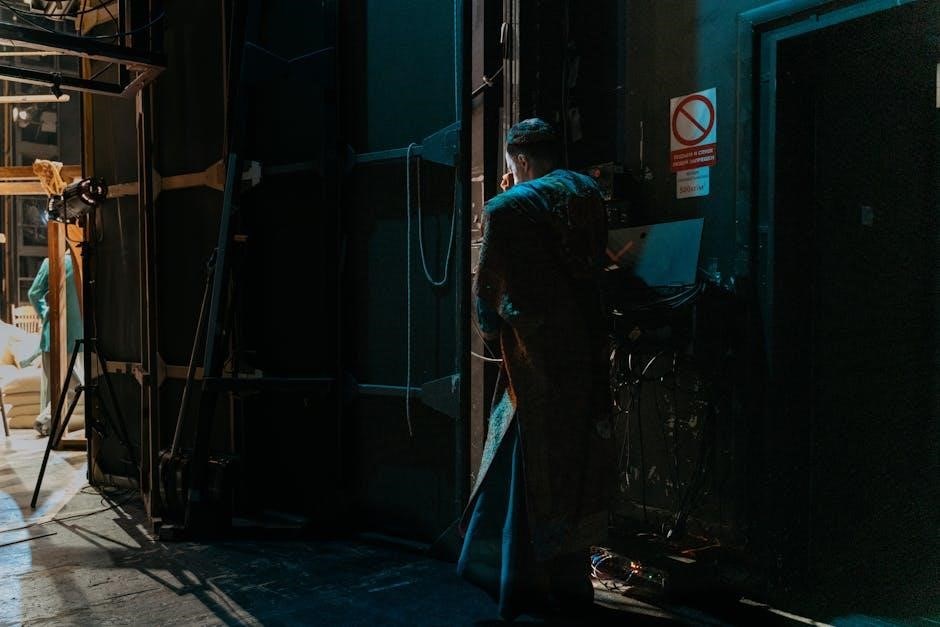Title
Exploring the Depths of Existentialism in Waiting for Godot Act 2
Act 2 of Waiting for Godot delves deeper into existential themes‚ showcasing the transformation of characters like Pozzo and Lucky‚ and the enduring wait for meaning.
Waiting for Godot Act 2: A Detailed Analysis
Act 2 of Waiting for Godot explores the themes of existentialism and absurdism through the ongoing wait for Godot. The tree‚ now bearing leaves‚ symbolizes subtle change and hope. Vladimir and Estragon’s dynamics reveal their dependency and existential struggles. Pozzo and Lucky’s return‚ transformed and diminished‚ highlight the inevitability of decline. The act reinforces the futility of waiting and the cyclical nature of human existence‚ deepening the play’s philosophical and emotional complexity.
Samuel Beckett’s Waiting for Godot is a seminal absurdist play exploring existential themes‚ featuring two acts‚ minimalistic dialogue‚ and a cyclical structure‚ influencing 20th-century theatre deeply.
Overview of the Play and Its Significance
Waiting for Godot‚ written by Samuel Beckett‚ is a landmark absurdist play that explores existential themes of meaninglessness‚ uncertainty‚ and the human condition. The play revolves around two acts‚ featuring minimalistic dialogue and a cyclical structure. Its significance lies in its profound reflection of post-war disillusionment and its influence on 20th-century theatre. The play’s themes of waiting‚ hope‚ and despair resonate universally‚ making it a timeless masterpiece of modern literature.
Vladimir and Estragon await Godot near a tree now bearing leaves. Pozzo and Lucky reappear transformed‚ with Pozzo blind and Lucky mute. A boy delivers a message that Godot won’t come‚ deepening the existential despair and ambiguity of their endless wait.
Key Events and Plot Development
Act 2 of Waiting for Godot unfolds with Vladimir and Estragon still waiting near a tree that now bears leaves‚ symbolizing subtle change. Pozzo and Lucky return‚ but their roles are reversed: Pozzo is now blind‚ and Lucky is mute. A boy arrives with a message that Godot will not come‚ intensifying the duo’s existential despair. The act ends with Vladimir and Estragon deciding to leave but remaining onstage‚ trapped in their endless cycle of waiting and ambiguity.
Character Analysis in Act 2
Vladimir and Estragon’s bond deepens as they admit feeling better alone but choose to stay together. Pozzo‚ now blind‚ and Lucky‚ mute‚ symbolize their lost purpose and control.
Vladimir and Estragon: Their Dynamics and Growth
Vladimir and Estragon’s relationship in Act 2 reveals their deep interdependence. They admit feeling better alone but choose to stay together‚ highlighting their emotional bond. Their conversations‚ though often circular‚ reflect a shared existential struggle. Estragon’s frustration and Vladimir’s philosophical musings underscore their contrasting personalities. The barren tree’s subtle change symbolizes hope‚ yet their inability to act emphasizes their stagnant existence. Their dynamics remain a mix of affection and irritation‚ trapped in their endless wait for Godot.
Pozzo and Lucky: Their Transformation and Significance
In Act 2‚ Pozzo and Lucky return transformed‚ reflecting the play’s themes of decay and absurdity. Pozzo‚ now blind‚ symbolizes lost control and desperation‚ while Lucky‚ mute‚ embodies silenced humanity. Their master-slave dynamic shifts‚ highlighting the futility of power. Pozzo’s cries for help and Lucky’s silence underscore existential despair. Their reappearance serves as a stark reminder of the cyclical nature of suffering and the inevitability of decline‚ deepening the play’s exploration of human futility.

Themes in Act 2
Act 2 explores existential absurdity‚ repetition‚ and futility‚ emphasizing the cyclical nature of life. Hope and despair intertwine as characters await meaning‚ highlighting humanity’s search for purpose.
The Absurd and Existentialism
Act 2 of Waiting for Godot profoundly explores the absurd‚ highlighting the meaninglessness of existence. Vladimir and Estragon’s endless wait for Godot symbolizes humanity’s futile search for purpose. Their repetitive dialogue and actions underscore the cyclical nature of life‚ devoid of progression or resolution. Existential themes emerge as characters confront their inability to change or escape their circumstances‚ embodying Beckett’s critique of human existence and the search for meaning in a seemingly indifferent world.
Hope‚ Despair‚ and the Wait for Meaning
Act 2 of Waiting for Godot masterfully interweaves hope and despair as Vladimir and Estragon cling to the promise of Godot’s arrival. Despite their suffering‚ moments of camaraderie and fleeting joy suggest resilience. The tree’s new leaves symbolize potential renewal‚ offering a glimmer of hope. Yet‚ their inability to escape the cycle of waiting underscores the futility of their existence‚ leaving them suspended between optimism and resignation‚ trapped in an endless pursuit of meaning.

Symbolism in Act 2
The tree’s leaves symbolize hope and change‚ while the rope embodies cycles of bondage and freedom‚ reflecting the characters’ existential struggles and the play’s deeper philosophical undertones.
The Tree: A Symbol of Change and Hope
The tree in Act 2‚ now bearing leaves‚ symbolizes subtle transformation and enduring hope. Its growth contrasts with the desolation of Act 1‚ hinting at the possibility of change. The tree also serves as a metaphor for the passage of time and the cyclical nature of existence. Its presence offers a glimmer of hope amidst the characters’ existential despair‚ reinforcing the play’s themes of waiting and the search for meaning in an uncertain world.
The Rope: A Symbol of Bondage and Freedom
The rope in Act 2 symbolizes both bondage and freedom‚ reflecting the complex dynamics between Pozzo and Lucky. Initially‚ it represents Pozzo’s control over Lucky‚ emphasizing domination and subjugation. However‚ as Pozzo’s power wanes‚ the rope’s significance shifts‚ hinting at the possibility of liberation. This duality mirrors the broader themes of existential entrapment and the elusive nature of freedom‚ highlighting the characters’ struggles with autonomy and dependence in a seemingly meaningless world.
Key Scenes in Act 2
Pozzo and Lucky’s dramatic return‚ the boy’s cryptic message‚ and Vladimir’s haunting song are pivotal moments‚ each underscoring the cyclical nature of waiting and existential despair.
Vladimir’s Song and Its Significance
Vladimir’s song in Act 2‚ about a dog’s tragic fate‚ encapsulates the play’s existential themes. Its repetitive melody mirrors the cyclical nature of their waiting‚ while its bleak lyrics reflect the absurdity of life. The song serves as a coping mechanism‚ momentarily distracting Vladimir and Estragon from their despair. It underscores the futility of their existence and the inevitability of suffering‚ resonating deeply with the play’s central motifs of hopelessness and the search for meaning.
The Reappearance of Pozzo and Lucky
Pozzo and Lucky reappear in Act 2‚ but their roles are starkly altered. Pozzo‚ now blind‚ and Lucky‚ mute‚ embody the play’s themes of decline and existential decay. Their return underscores the cyclical nature of time and the futility of purpose. Pozzo’s desperation contrasts with his earlier arrogance‚ while Lucky’s silence highlights the loss of meaning. Their transformation mirrors the absurdity of life‚ reinforcing the play’s central motifs of despair and the search for significance.
The Boy’s Message and Its Implications
The boy’s message in Act 2 serves as a pivotal moment‚ reinforcing the play’s themes of uncertainty and waiting. He informs Vladimir that Mr. Godot will not come today but promises he will tomorrow. This message‚ though ambiguous‚ instills a glimmer of hope while perpetuating the cycle of anticipation. It underscores the characters’ existential limbo‚ leaving them suspended between despair and expectation‚ unable to escape their endless wait.

Dialogues and Their Implications
Vladimir and Estragon’s conversations in Act 2 reveal their existential struggles and dependence on each other‚ while interactions with Pozzo and Lucky highlight the absurdity of their situation.
Vladimir and Estragon’s Conversations
Vladimir and Estragon’s dialogues in Act 2 reflect their existential struggles and deepening dependency. Their exchanges reveal a mix of hope‚ despair‚ and absurdity‚ as they grapple with the meaninglessness of their wait for Godot. Conversations often spiral into circular reasoning‚ emphasizing the futility of their situation. Estragon’s frustration and Vladimir’s optimism create a dynamic tension‚ while their attempts to fill time highlight the human need for purpose‚ even in the face of uncertainty and isolation.
Interactions with Pozzo and Lucky
Pozzo and Lucky’s return in Act 2 brings a stark transformation‚ as Pozzo is now blind and Lucky mute. Their interactions with Vladimir and Estragon are marked by confusion and heightened absurdity. Pozzo’s desperation contrasts with Lucky’s silence‚ while Vladimir and Estragon’s reactions reveal their own vulnerabilities. These exchanges underscore the play’s themes of decay‚ dependency‚ and the cyclical nature of suffering‚ deepening the existential complexity of their encounters.
The Ending of Act 2
Vladimir and Estragon decide to leave but remain onstage‚ emphasizing their inertia. The act ends ambiguously‚ leaving Godot’s arrival uncertain and their fate unresolved.
Ambiguity and Open Interpretation
The ending of Act 2 leaves audiences with profound ambiguity‚ as Vladimir and Estragon decide to leave but remain onstage. This paradox underscores their inability to act‚ reflecting existential inertia. The uncertainty of Godot’s arrival persists‚ symbolizing the futility of waiting for meaning in an indifferent world. Beckett’s minimalist ending invites interpretations‚ leaving the audience to ponder themes of hope‚ despair‚ and the cyclical nature of existence. The tree’s subtle change mirrors their unresolved journey.

Act 2 in the Context of the Entire Play
Act 2 mirrors and deepens the existential themes of Act 1‚ reinforcing the cyclical nature of waiting and the futility of seeking meaning in an indifferent universe.
Connecting Act 2 to the Broader Themes
Act 2 reinforces the play’s central themes of existential absurdity‚ repetitive existence‚ and the futile search for meaning. The cyclical nature of waiting‚ evident in Vladimir and Estragon’s ongoing dilemma‚ underscores the futility of their existence. The transformation of Pozzo and Lucky highlights the decay of human dignity‚ while the boy’s ambiguous message perpetuates the mystery of Godot. These elements collectively emphasize the absurdity of life and humanity’s enduring quest for purpose in a seemingly indifferent world.
Act 2 of Waiting for Godot encapsulates the play’s essence‚ reinforcing themes of absurdity‚ existential despair‚ and the cyclical nature of human existence‚ leaving audiences contemplating life’s meaning.
Final Thoughts on Act 2 and Its Relevance
Act 2 of Waiting for Godot encapsulates the play’s essence‚ deepening existential themes and reinforcing the cyclical nature of human existence. The reappearance of Pozzo and Lucky‚ Vladimir’s haunting song‚ and the tree’s subtle transformation underscore the futility of waiting. Through these elements‚ Beckett masterfully explores absurdity‚ hope‚ and despair‚ leaving audiences to ponder the meaning of existence and the inevitability of time passing without resolution.
